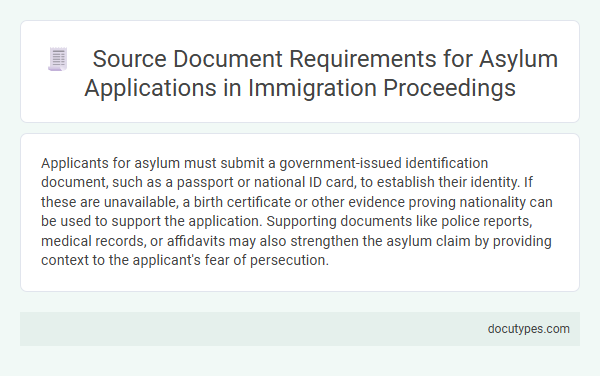Applicants for asylum must submit a government-issued identification document, such as a passport or national ID card, to establish their identity. If these are unavailable, a birth certificate or other evidence proving nationality can be used to support the application. Supporting documents like police reports, medical records, or affidavits may also strengthen the asylum claim by providing context to the applicant's fear of persecution.
Overview of Source Document Requirements for Asylum
Applying for asylum requires submitting specific source documents to establish eligibility and support your claim. Proper documentation helps immigration authorities verify identity, nationality, and the basis of persecution claims.
- Identification Documents - Official photo IDs such as passports or national identity cards prove the applicant's identity and nationality.
- Evidence of Persecution - Documents like police reports, medical records, or affidavits demonstrate credible fear of persecution based on race, religion, nationality, political opinion, or membership in a particular social group.
- Application Forms - Completed forms such as Form I-589 (in the U.S.) must be submitted as the formal asylum application to initiate the legal process.
Essential Identity Documents for Asylum Applications
Essential identity documents for an asylum application include a valid passport or national identity card, which verify the applicant's nationality and personal details. If these primary documents are unavailable, alternative evidence such as birth certificates, driver's licenses, or other official records may be submitted. Providing accurate and verifiable identity documents is crucial in establishing the applicant's identity and supporting the asylum claim.
Proof of Nationality in Asylum Cases
Proof of nationality is a critical component of an asylum application. It helps establish your identity and country of origin, which are essential for the asylum process.
Common source documents include passports, national identity cards, or birth certificates. If these documents are unavailable, affidavits or testimony can sometimes be accepted to support your claim.
Documentation of Persecution or Threats
Applicants seeking asylum must provide credible documentation of persecution or threats to support their claim. Essential source documents include police reports, medical records, affidavits, and country condition reports illustrating past harm or credible threats. These documents validate the applicant's fear of returning to their home country and strengthen the asylum case.
Evidence of Entry and Travel History
When applying for asylum, evidence of entry and travel history is a crucial source document. This documentation helps establish the timeline and circumstances of the applicant's arrival in the host country.
Key documents include passports, visas, and entry stamps that verify the date and point of entry. Travel itineraries, boarding passes, and flight tickets also provide important details about the applicant's movements. These records form the foundation for assessing eligibility and credibility in the asylum process.
Supporting Affidavits and Witness Statements
What source document is required for an asylum application regarding supporting affidavits and witness statements? Supporting affidavits and witness statements serve as crucial evidence to corroborate Your claim for asylum. These documents provide detailed personal accounts from individuals who can attest to Your experiences or conditions in Your home country.
Medical and Psychological Records
Medical and psychological records play a crucial role in supporting your asylum application by providing evidence of past trauma or persecution. These documents help establish the severity and impact of your experiences on your health and well-being.
- Medical Records - Detailed reports from doctors or hospitals documenting injuries or illnesses related to persecution.
- Psychological Evaluations - Professional assessments that describe mental health conditions resulting from traumatic events or abuse.
- Treatment Histories - Records of ongoing therapy or medical care demonstrating sustained health issues linked to your asylum claim.
Translation and Certification of Foreign Documents
| Source Document Required for Asylum Application | Original foreign documents supporting the asylum claim, such as identity papers, birth certificates, police reports, or medical records. |
|---|---|
| Translation Requirement | All non-English documents must be accompanied by a full English translation. The translation must be complete and accurate, reflecting the original document's content faithfully. |
| Certification of Translation | The translator must provide a signed certification stating they are competent in both languages and that the translation is true and accurate to the best of their knowledge and ability. |
| Accepted Translators | Professional translators, accredited translation services, or qualified bilingual individuals familiar with legal terminology are acceptable. |
| Submission Guidelines | Submit the original foreign document along with the certified English translation. Incomplete or uncertified translations may delay or adversely affect the asylum application process. |
Handling Missing or Unavailable Source Documents
When applying for asylum, you typically need to provide source documents such as identity papers, birth certificates, or passports. These documents verify your nationality and support your claim for protection.
If source documents are missing or unavailable due to conflict, persecution, or other reasons, you must explain the situation clearly in your application. Providing alternative evidence, such as affidavits, witness statements, or country condition reports, can help strengthen your case.
What Source Document Is Required for an Asylum Application? Infographic

